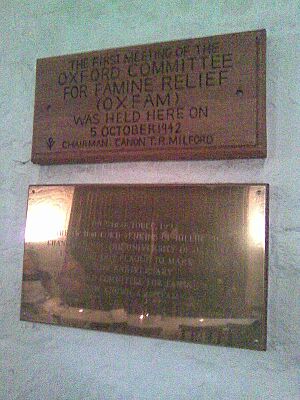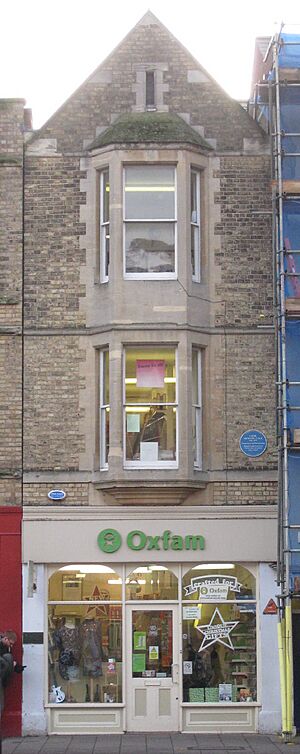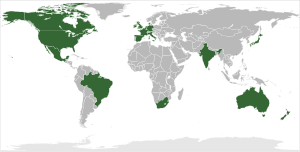Oxfam facts for kids
 |
|
| Named after | Oxford Committee for Famine Relief |
|---|---|
| Founded | 5 October 1942 |
| Founded at | Oxford, England |
| Type | International NGO |
| Registration no. | 202918 |
| Focus | Poverty eradication Disaster relief Advocacy Policy research Migration advocacy |
| Headquarters | Nairobi, Kenya |
|
Area served
|
Worldwide |
|
Director
|
Amitabh Behar |
| Aruna Rao (Chair) | |
Oxfam is a large group of 21 independent organizations. It was started in Britain in 1942. Its main goal is to help reduce poverty around the world.
Oxfam began as the Oxford Committee for Famine Relief. This was in Oxford, UK, during World War Two. It aimed to help people who were hungry because of the war. After the war, Oxfam continued its important work. Today, Oxfam works in 79 countries. It has members in many parts of the world.
Since 2005, Oxfam International has faced some challenges. There have been criticisms about how it managed its work. This included operations in Haiti and Chad. There were also concerns about its management in the UK.
Oxfam's Story: How It Started
Oxfam started in 1942 in Oxford, England. It was called the Oxford Committee for Famine Relief. A group of caring citizens founded it. These included Quakers, social activists, and university professors.
Their first meeting was in the Old Library. This was at the University Church in Oxford. Their goal was to help people starving in Greece. Greece was occupied during World War Two. The war and blockades caused a terrible famine. Oxfam wanted the British government to let food relief through.
First Shops and Growth
The first permanent Oxfam shop opened in 1947. It was on Broad Street in Oxford. Joe Mitty became Oxfam's first paid employee in 1949. He managed the shop and distributed donated clothes. Joe had the idea to sell anything people donated. This helped the shop grow into a national chain.
Oxfam used new ways to raise money. This included advertising and direct mail. These efforts helped Oxfam become a very large charity in the UK. By 1960, it was an international aid organization.
The first overseas Oxfam group started in Canada in 1963. In 1965, the organization changed its name to OXFAM. This was its telegraph address. The original Oxford committee became known as Oxfam GB.
In 1995, Oxfam International was created. It brought together many independent Oxfam groups. This new international group was officially registered in the Netherlands in 1996.
Winnie Byanyima was the leader of Oxfam International from 2013 to 2019.
What Oxfam Does
Helping People in Need
Oxfam helps people during many global crises. This includes conflicts and natural disasters. They have provided aid in places like the Israeli–Palestinian conflict and during droughts in East Africa. They also helped after the Nepal earthquake.
Oxfam is known for providing clean water and sanitation. They help in poor and war-affected areas. In 2012, Oxfam joined the UK's Rapid Response Facility. This group ensures clean water after disasters.
Oxfam also studies global wealth. A 2014 report showed that a small number of very rich people had as much wealth as half the world's population. In 2017, they reported that eight billionaires had the same wealth as the poorest half of humanity.
Today, Oxfam focuses on several key areas. These include economic inequality and fair taxes. They also work on gender justice and climate change.
Past Campaigns for Fairness
Oxfam International has run campaigns like "Make Trade Fair." This campaign works to stop unfair trade practices. One issue is "dumping." This is when rich countries sell extra goods cheaply. This makes it hard for farmers in poor countries to compete.
Oxfam also opposes high taxes on imported goods. These taxes can stop products from other nations from being sold. They also fight for fair labor rights for women. Women often earn less than men for the same work. Another issue is strict patents. These can keep prices high for medicines and textbooks. This makes them hard to get in developing nations.
Oxfam has also campaigned about coffee farming. In 2006, they accused Starbucks of trying to block Ethiopia's trademark for its coffee beans. Oxfam said this could cost Ethiopian farmers a lot of money. After discussions, an agreement was reached in 2007. This deal recognized Ethiopia's special coffee names. Oxfam said it was a good step if farmers benefited.
Oxfam Shops Around the World
Oxfam has many shops globally. They sell fair-trade items and donated goods. The first charity shop opened in 1948. Money from these sales helps Oxfam's work worldwide.
Much of the stock comes from public donations. Oxfam also sells fair trade products. These come from developing countries in Africa, Asia, and South America. They include handicrafts, books, music, and clothing. Selling these items through fair trade helps improve the lives of the people who make them.
As of 2010, Oxfam had over 1,200 shops. More than half were in the UK. These included special shops for books, music, and furniture. Oxfam is the largest seller of used books in Europe. They sell about 12 million books each year. In 2008, over 20,000 volunteers worked in Oxfam GB shops. They raised a lot of money for Oxfam's programs.
Some Oxfam shops closed in 2020. This was partly due to financial losses.
Raising Money for Good Causes
Oxfam has other ways to raise money besides its shops. Over half a million people in the UK regularly donate to Oxfam. In 2017, Oxfam charities were fined for misusing donor information.
Oxfam's Global Network
Oxfam International has 21 member organizations. Its main office is in Nairobi, Kenya. It also has offices in other major cities like Washington, D.C., and Brussels.
| Affiliates | Country/Region | Established | Full affiliate since |
|---|---|---|---|
| Oxfam America | 1970 | 1995 | |
| Oxfam Australia | 1954 (as Food for Peace Campaign) | 1995 | |
| Oxfam Belgique/ Oxfam België | 1964 | 1995 | |
| Oxfam Brasil | 1958 | 2016 | |
| Oxfam Canada | 1966 | 1995 | |
| Oxfam Colombia | 2020 | 2021 | |
| Oxfam France | 1988 | 2006 | |
| Oxfam Germany | 1995 | 2003 | |
| Oxfam GB | 1942 | 1995 | |
| Oxfam Hong Kong | 1976 | 1995 | |
| Oxfam Denmark | 1966 (as World University Service, WUS) | 2015 | |
| Oxfam Italia | 1976 (as Ucodep) | 2012 | |
| Oxfam Intermón | 1956 (as Intermón) | 1997 | |
| Oxfam India | 2008 | 2011 | |
| Oxfam Ireland | 1971 (as Oxfam Northern Ireland) | 1998 | |
| Oxfam Mexico | 1996 | 2008 | |
| Oxfam New Zealand | 1991 | 1995 | |
| Oxfam Novib | 1956 (as Novib) | 1995 | |
| Oxfam Québec | 1973 | 1995 | |
| Oxfam Türkiye | 1986 | 2019 | |
| Oxfam South Africa | 2013 | 2016 |
Oxfam Japan was a member until it closed in 2018. Oxfam is also looking to add more members in the Global South.
Oxfam International: The Main Hub
The Oxfam International Secretariat (OIS) helps all the Oxfam groups work together. The OIS Board includes the director and the head of each member group. This board makes sure Oxfam International is responsible and clear in its work. It is funded by money from the member organizations.
Oxfam America: Helping from the USA
Oxfam America became an independent group in 1970. This was to help with a crisis during the fight for independence in Bangladesh. Its main office is in Boston, Massachusetts. It also has an office in Washington, D.C. Oxfam America works on climate change, food security, and fair trade. Abby Maxman is the current president and CEO.
Oxfam Australia: A Key Partner
Oxfam Australia is an independent, non-profit organization. It focuses on aid and development. It is a member of Oxfam International.
Oxfam Denmark: From Local to Global
Oxfam Denmark started in 1966. It was first known as World University Service. It worked against unfair systems in southern African nations. Since the 1970s, it has focused on projects in Africa and Latin America. These projects often dealt with democracy and education. In 2015, it joined Oxfam International. In 2023, it fully changed its name to Oxfam Denmark. Today, it works on education, climate justice, and humanitarian aid.
Oxfam GB: The Original Group
Oxfam GB's main office is in Oxford, UK. Its finance office is in Newcastle. This is where Oxfam shops are managed. In 2016/17, Oxfam GB had a total income of £408.6 million. It had 5,000 employees and 23,000 volunteers. It also received money from the British government.
Dhananjayan Sriskandarajah was the chief executive officer from 2019 to 2023. Halima Begum became the new chief executive officer in December 2023. Oxfam GB publishes a magazine for its supporters called "Voices."
Oxfam India: A Long History of Help
Oxfam first helped in India in 1951. They sent money to fight a famine in Bihar. Bihar was a very poor and crowded state. Oxfam's appeal for donations was even mentioned in the UK Parliament.
Oxfam returned to India in 1965 due to droughts. Many people in Bihar relied on farming to live. Oxfam bought a lot of milk to feed children and mothers. In 1968, Oxfam started its first rural development program in India. This was a new step for Oxfam. Oxfam India was officially created in 2008. It is now a member of Oxfam International.
As of January 2022, Oxfam India lost its license to receive foreign funding. This license is needed for charities in India.
Oxfam New Zealand: Helping the Pacific
Oxfam New Zealand is an aid and development group. It is also part of Oxfam International. Oxfam NZ helps with cyclone relief in the Pacific region. Its work is supported by donors, staff, and volunteers. Most of its funds come from donations. The New Zealand government also provides some funds.
Awards and Recognition
In January 2013, Oxfam was nominated for the Charity of the Year award. This was at the British Muslim Awards.
More to Explore
- 2007–08 world food price crisis
- Global Hunger Index
- Millennium Development Goals (Goal 1)
- Make Trade Fair
- Ox-Tales
- Universal Declaration on the Eradication of Hunger and Malnutrition (1974)
See also
 In Spanish: Oxfam para niños
In Spanish: Oxfam para niños
 | Shirley Ann Jackson |
 | Garett Morgan |
 | J. Ernest Wilkins Jr. |
 | Elijah McCoy |






